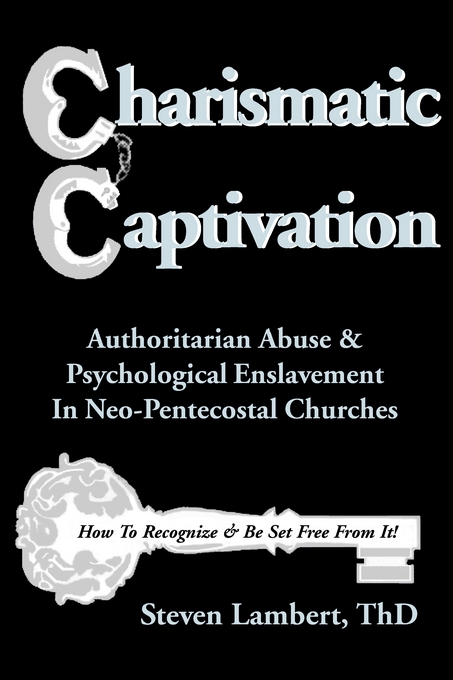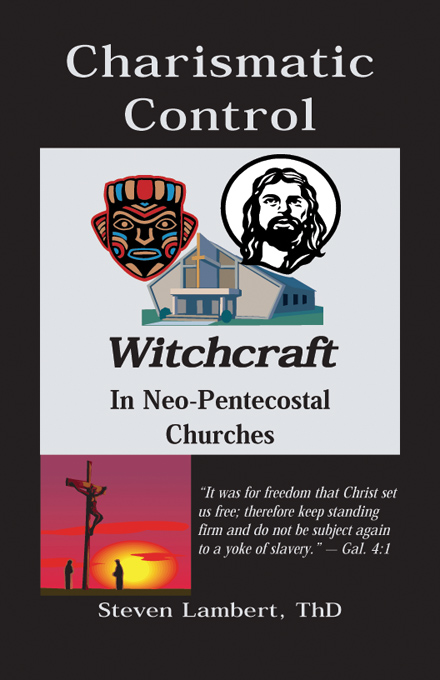So Jesus was saying to those Jews who had believed Him, "If you continue in MY WORD, then you are truly disciples of Mine; and you will know the TRUTH, and the TRUTH will make you FREE." (John 8:31,32; NASB)
It was for FREEDOM that Christ set us FREE; therefore keep standing firm and do not be subject again to a YOKE OF SLAVERY. (Gal. 5:1; NASB)
[Editor's note: This article is adapted from the book, CHARISMATIC CAPTIVATION. The book exposes the widespread problem of authoritarian abuse in Neo-Pentecostal church-groups, and explains how it became infused into the very fabric, foundation, and functions of the Neo-Pentecostal church arising out of a false movement known as the Discipleship/Shepherding Movement (1970-77). References to "Discipleship" or "Shepherding" (and variables) doctrines, teachings, proponents and participants, and so forth, allude to those pertinences that arose out of that "movement." The content of this article is contextual to the entirety of the book, and is best understood by reading the book. A small portion of the book's content is published in the posted articles listed and linked at the end of this article.]
Woe to the rebellious children, saith the LORD, that take counsel, but not of me; and that COVER with A COVERING, but not of my spirit, that they may add sin to sin: That walk to go down into EGYPT [symbol of captivity in Scripture], and have not asked at my mouth; to strengthen themselves in the strength of Pharaoh [symbol of Satan and autocratic dictators in Scripture], and to trust in the shadow of Egypt! Therefore shall the strength of Pharaoh be your shame, and the trust in the shadow of Egypt your CONFUSION. For his princes were at Zoan [aka, Goshen, where Pharaoh met with Moses and Aaron; Easton's Bible Dictionary], and his ambassadors came to Hanes. They were all ashamed of a people that could not PROFIT them, nor be an help nor PROFIT, but a shame, and also a reproach. (Isaiah 30:1-5; KJV; emphases and parentheses added)
Before I begin this article, let me emphasize that it is vital that you first read Part 1 of this series which is its foundation.
Albeit, as a preface to this part, I will summarize some of what I stated at the outset of Part 1. To begin with, "Spiritual covering" as theorized by proponents, propagators, and practitioners of these hyper-authoritarian teachings is an absolute MYTH and outright deception! No semblance of the teachings concerning "spiritual covering" exists anywhere within the pages of Scripture. It is a complete fabrication concocted by the originators of these fallacious doctrines as a pretext for facilitation of entirely self-aggrandizing objectives of subjugation, domination, and control.
[For a detailed history of the Shepherding Movement and the genesis of these false doctrines, READ THIS ARTICLE.]
Indeed, what the Discipleship proponents refer to as "spiritual covering" is really "spiritual control." However, even the use of the word "spiritual" in this connection requires some qualification, because the only thing "spiritual" about this unauthorized control is that it is inspired by demon-spirits of deception and error. As I explain in detail in Charismatic Captivation, what the Discipleship version of "spiritual covering" really is, is nothing less than witchcraft or sorcery. When the myth has been thoroughly debunked, as it will be within these pages, it will be clear that this doctrine of "spiritual covering," like all the other aspects of the Shepherdship heresy, is a patently false "doctrine of demons" being manifested in these last days precisely in accordance with Holy Prophecy of Scripture which foretells of deception such as this being promulgated by demons in the last days, leading to many falling away from the Lord into apostasy:
But the Spirit explicitly says that in later times some will fall away from the faith, paying attention to deceitful spirits and doctrines of demons, by means of the hypocrisy of LIARS seared in their own conscience as with a branding iron. (1 Tim. 4:1,2)
Spiritual Mediators
One of the foundational tenets of these fallacious hyper-authoritarian teachings is the matter of "absolute submission." Today, some thirty years after the Shepherding Movement teachings were soundly debunked and their originators publicly discredited, Neo-Pentecostal preachers and teachers for the most part are careful not to use that specific terminology. However, in the case of the majority of their audiences and adherents it is not necessary to expressly allude to the matter anyway, because the essence of the concept, as I repeatedly indicate throughout my writings on the topic, has been infused into the very fabric, foundation, and functions of the entire Neo-Pentecostal Movement. Not to say that the tentacles of these deceptive teachings have not reached into Pentecostal and non-Pentecostal sects and denominations as well, for they certainly have. Even Baptists, Methodists, Episcopalians, and other denominations have been polluted by the poisoned waters of the Shepherding doctrines in the form of the widely proliferated "Alpha Course," over several decades now.
The premise of "absolute submission" is predicated on the hypothesis that the spiritual leaders are in effect (though most Discipleship teaching adherents would emphatically deny the attribution) "spiritual mediators" between God and their followers, who assume the role of hearing from God on the behalf of their followers. According to the theory, the followers are spiritually deficient and inferior to the chain of leaders who are over them, and thus basically incapable of seeking and hearing from God for themselves and cultivating on-going communion and fellowship with God, so they need a human "mediator"—someone who supposedly has a more elite status and standing with God—to be a priestly "go-between" between "the stupid sheep" and God. The hypothesis is that the leaders are much more spiritual than the people, and therefore more capable of hearing from God what is best for their followers. By the way, if that premise sounds familiar to you, you are right, because in essence it is virtually identical to the theories upon which the surrogate priesthood and papal system of Catholicism were based, which, totally supplanted and negated the personal priesthood of believers in the Medieval Church. [Read Chapter 3 of Charismatic Captivation, for a revealing dissertation concerning the Nicolaitans and that sects' connection with the genesis of the "Universal (Catholic) Church."]
This whole matter of "spiritual mediators" is so totally ludicrous and such a complete affront to the truth of the personal priesthood of believers that every knowledgeable believer should be thoroughly disgusted and totally outraged at such an idiotic, outlandish, and even blasphemous notion. The Bible explicitly says: "There is one God, and ONE mediator also between God and men, the man Christ Jesus, who gave Himself as a ransom for all...." (1 Tim. 2:5). There is never, ever to be any "spiritual mediators" between God and men, except the Christ—Jesus Himself. The Man with the nail-prints in His wrists is the only true spiritual mediator between God and Man. All the rest are pretentious impostors! Jesus is the only Man (human) who ever lived a perfectly sinless life, which was the requisite enabling Him to become the Spotless Lamb of God, the propitiatory sacrifice, typified by the oblational sacrificial lambs, which the Jewish high priests offered up for the sins of the people century after century.
So also was Jesus the true Spiritual High Priest, who those centuries of natural high priests who offered up the sacrificial lambs year after year represented. Those that came before Him were the types and the shadows, the mere "eikons" (Gr.) (reflections) of the real. Jesus was the real, the source of the reflection. He was the Image that the types and shadows reflected. He was the true Sacrificial Lamb who took away the sins of the world. And, He was the true Spiritual High Priest (Heb. 3:1), who offered up the true Sacrificial Lamb—His own sinless life—as a ransom for all, once and for all.
And the former priests, on the one hand, existed in greater numbers, because they were prevented by death from continuing, but He (Christ Jesus), on the other hand, because He abides forever, holds His priesthood permanently. Hence, also, He is able to save completely those who draw near to God through Him, since He always lives to make intercession for them. For it was fitting that we should have such a High Priest, holy, innocent, undefiled, separated from sinners and exalted above the heavens; who does not need daily, like those (O.T. Jewish) high priests, to offer up sacrifices, first for his own sins, and then for the sins of the people, because this He did ONCE FOR ALL when He offered HIMSELF. (Heb. 7:23-28)
...we have such a High Priest, who has taken His seat at the right hand of the throne of the Majesty in the heavens, a Minister in the sanctuary, and in the true tabernacle, which the Lord pitched, not man. (Heb. 8:1,2)
But when CHRIST appeared as a High Priest of the good things to come, He entered through the greater and more perfect tabernacle, not made with hands, that is to say, not of this creation; and not through the blood of goats and calves, but through His own blood, He entered the holy place once for all, having obtained eternal redemption. (Heb. 9:11,12)
The point is that the true High Priest (i.e., Christ) has now entered into the true Holy of Holies into the actual presence of God as the ultimate and only effectual Mediator on our behalf (Heb. 9:23,24). He lives evermore in the presence of God as our Intercessor (Heb. 7:25), having appeased His righteous wrath, having taken upon Himself the punishment due us, and having canceled out our debt of transgressions which separated and disfellowshipped us from God. Hence, since Christ Jesus has accomplished the ultimate on our behalf before God, and perpetually lives in the presence of God as our spiritual High Priest and Intercessor, and since He has made peace for us between ourselves and God forevermore (Rom. 5:1), we hardly need human mediators between us and God.
His once-and-for-all sacrifice and entrance into the true Holy of Holies has granted us all equal access, free access, bold and confident access (Eph. 3:12), not only into the Holy Place, but also even behind the veil into the Holy of Holies, for each of us, even unto the very Throne of Grace itself, that is to say, the very Throne of "the God of all Grace" (1 Pet. 5:10). Of this access we are invited to avail ourselves freely, not coweringly but boldly, "Let us therefore come boldly unto the throne of grace that we may obtain mercy, and find grace to help in time of need" (Heb. 4:16, KJV).
To suggest that any human could do this for us as a mediator between us and God is not only preposterous and absurd, but also an affront to Jesus Himself. It is blasphemy! Those who pose and interpose themselves as mediators between believers and God are fortunate that God has not struck them down dead! Indeed, I believe this very thing will happen in the days ahead. God is now issuing fair warning! If Uzza, the loyal friend and servant of David was struck dead by God for merely touching the religious icon of God's presence, and if Ananias and Sapphira were struck down dead by God for having lied to the Holy Spirit, how much severer punishment would one deserve who is so blatantly blasphemous as to purport to be the spiritual mediator between God and men?
[To read how this matter of "absolute authority" and "spiritual covering" has been used as a premise for sexual authoritarian abuse by unscrupulous Pentecostal and Neo-Pentecostal church leaders, in particular, read the full article.]
Ultimate Accountability
You see, when taken to their fullest extent, what these false teachings culminate in, is an infringement upon the Biblical fact of ultimate accountability to God, which is to say that in the end everyone is accountable to God, and to God alone, for his/her conduct and for the substance of the life he/she lived. Ultimately, it is to an Almighty and All-Knowing God that we must give account for the totality of our lives. Ultimately, each believer is accountable only to the authority of God Himself, and not to any supposed "spiritual authority" of men, whether it be an individual or a humanly-constructed hierarchy.
This Truth and its veracity is unequivocally and wholly supported by the preponderance of Scripture, and proof-texts corroborating this absolute fact are so numerous that to quote them all would require a separate volume of its own. But, there is one passage that states it about as directly and succinctly as it can be stated, which is, Romans 14:12: "So then EACH OF US shall GIVE ACCOUNT of HIMSELF to GOD."
Moreover, the verses that precede this particular passage are also extremely enlightening and germane to this point regarding ultimate accountability unto God. In verse four, Paul poses the consummate question to which every believer would be well-advised to give careful heed: "Who are you to judge the servant of another?"
To judge someone else, it is imperative to understand, by its very nature, means that the person who is sitting in the seat of the judge is of a greater status, standing, authority, and behavioral stature, than the one who is being judged. Yet, clearly an overwhelming preponderance of Scripture teaches that as Jesus stated, "You (all believers) are all on the same level as brothers" (Mat. 23:8; L.B.; parenthesis added by author). As established repeatedly throughout this book, in the Kingdom of God there is absolute parity among believers. There is no such a thing as "big me, little you" in the Kingdom of God. Oh, to be sure, in real life, demonstration of carnal attitudes of ascendancy and arrogance over fellows is just as common among purporting believers as it is in the world. But, that is not the way it really is in the Kingdom of God and from God's perspective. Such fleshly attitudes are of the category of the "evil passions and desires" which every believer must crucify if he is going to show forth evidence or fruit that he has been genuinely Born Again and been made a bona fide partaker of the attributes of the Divine Nature (Gal. 5:24; 2 Pet. 2:4).
Notice also in the verse cited (Rom. 14:4) the phrase "servant of another." This makes it abundantly clear that every believer is a bond-servant of God, not of any man. Even when of our own volition we lay down our lives to serve others, we do so because in so doing the Person we are ultimately serving is God, not even the people we are serving, though they are the ostensible recipients of our service. The verse continues by saying: "To HIS OWN MASTER he stands or falls; and stand he will, for THE LORD is able to make him stand." In saying, " THE LORD is able to make him stand," the passage identifies the "master" of the believer as being the Lord Jesus Himself, and not any human.
Verses seven through nine of the same chapter in Romans go on to clearly indicate that every believer "belongs" ultimately to the Lord, and thus is not the subject of any human being in terms of ultimate accountability for his or her life:
For not one of us lives for himself, and not one dies for himself; for if we live, we live FOR THE LORD, or if we die, we die FOR THE LORD; therefore whether we live or die, WE ARE THE LORD'S. For to this end Christ died and lived, that HE might be LORD both of the dead and of the living.
But, the next verse, verse ten, really puts it all into proper perspective by reminding us that none of us have the right to take unto ourselves the status of judge over our fellows with regard to the final analysis, assessment, and adjudication of their lives, as well as the fact that none of us have attained unto the transcendent or elite status required to grant us the right to regard a fellow believer with contempt or condescension, or regard any fellow believer, who is also a joint-heir, that is, equal-heir, with Christ, as in any way inferior or "subjectable" to us so as to be their judges, because we are not the judges; rather, we all are the "judgees," ourselves who will be judged by "the righteous Judge" (2 Tim. 4:8):
But you, why do you judge your brother? Or you again, why do you regard your brother with contempt? FOR WE SHALL ALL STAND BEFORE THE JUDGMENT SEAT OF GOD. (Rom. 14:10)
Hebrews 12:23 refers to "THE Judge of ALL," which is none other than God Himself. Hebrews 10:30 plainly tells us: "THE LORD will judge His people," which means that ultimate accounting and the final adjudication of our lives is relegated to the Lord alone. The reason for this is simple: perfect and perfectly righteous and just judgment requires omniscience and infinite knowledge and wisdom, which we, in our human estate of extremely finite knowledge, do not possess. Only God is capable of judging "the thoughts and intentions of the heart" with perfect knowledge, wisdom, and understanding, for it is to His eyes, the manifold eyes of the Spirit, alone that all that we are is "open and laid bare" (Heb. 4:12,13). He who knows us most is the one who can judge us best. No one knows us—who we really are, the totality of our constitution and the reasons behind it all, good or bad—like God knows us. Amazingly, God is the one who KNOWS us BEST and yet LOVES us the MOST.
Thus, we see the incontrovertible and unequivocal truth that ultimately every believer is accountable to God and not to any mere mortal. As I have said elsewhere in this volume, only the one with the nail prints in His hands is the one who has been found worthy to be our Lord, Master, and Savior. This is precisely the import of James' statement wherein speaking of Jesus He says: "There is ONLY ONE Lawgiver and Judge, THE ONE WHO IS ABLE TO SAVE and to destroy, but who are you to judge your neighbor?" (Jas. 4:12).
So, dear saint of God, the next time someone tries to "pull rank" on you, intimidate, or subjugate you with some humanly contrived, imaginary, unauthorized, invalid, Scripturally-prohibited, and non-existent, claim of pseudo-authority, ask that person to stretch forth his or her hands, and look to see if there are nail-holes in those hands. If not, just have a good chuckle, turn, walk away, and simply forget it! Because that person is not YOUR Lord or YOUR Master! He's just another pretender and imposter—false Christ—motivated by an antichrist spirit! Then PRAISE JESUS—the One who is able to save and destroy to the uttermost—FOREVER! HE ALONE is Lord!
[For more on the detrimental effects of submitting yourself under the spiritual coverings of men, I urge you to read The Curses of Unauthorized Covenants.]
[To read this article in its entirety, click on the title above. There are links on that page to other related articles.]













